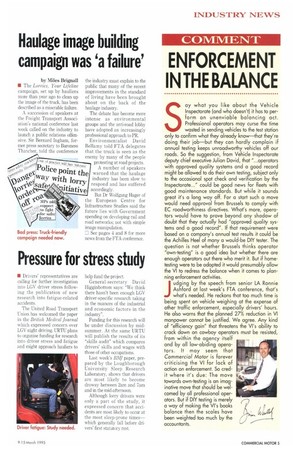ENFORCEMENT IN THE BALANCE
Page 7

If you've noticed an error in this article please click here to report it so we can fix it.
Say what you like about the Vehicle Inspectorate (and who doesn't) it has to perform an unenviable balancing act. Professional operators may curse the time wasted in sending vehicles to the test station only to confirm what they already know—that they're doing their job—but they can hardly complain if annual testing keeps unroadworthy vehicles off our roads. So the suggestion, from Vehicle Inspectorate deputy chief executive Julian David, that "...operators with approved quality systems and a good record might be allowed to do their own testing, subject only to the occasional spot check and verification by the Inspectorate..." could be good news for fleets with good maintenance standards. But while it sounds great it's a long way off. For a start such a move would need approval from Brussels to comply with EC roadworthiness directives. What's more, operators would have to prove beyond any shadow of doubt that they actually had "approved quality systems and a good record". If that requirement were based on a company's annual test results it could be the Achilles Heel of many a would-be DIY tester. The question is not whether Brussels thinks operator "own-testing" is a good idea but whether there are enough operators out there who merit it. But if hometesting were to be adopted it would presumably allow the VI to redress the balance when it comes to planning enforcement activities. judging by the speech from senior LA Ronnie Ashford at last week's FTA conference, that's what's needed. He reckons that too much time is being spent on vehicle weighing at the expense of other traffic enforcement, especially drivers' hours. He also warns that the planned 27% reduction in VI manpower cannot be justified. We agree. Any kind of "efficiency gain" that threatens the VI's ability to crack down on cowboy operators must be resisted, from within the agency itself and by all law-abiding opera tors. It may seem that Commercial Motor is forever criticising the VI for lack of action on enforcement. So cred it where it's due: The move towards own-testing is an imag inative move that should be wel comed by all professional operators. But if DIY testing is merely a way of making the VI's books balance then the scales have been weighted too much by the accountants.
































































































